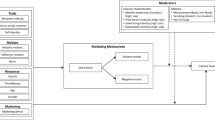Abstract
The ideology of consumption and the imperative of consumer choice have washed across the globe. In today's developed economies there is an ever-increasing amount of buying, amidst an ever-increasing amount of purchase options, amidst an ever-increasing amount of stress, amidst an ever-decreasing amount of discretionary time. This brief essay reviews research suggesting, for example, that hyperchoice confuses people and increases regret, that hyperchoice is initially attractive but ultimately unsatisfying, and that hyperchoice is psychologically draining. Future research is then discussed, including how and why hyperchoice may have other toxic effects on people, including the degrading of moral emotions and behavior.
Similar content being viewed by others
References
Ariely, D. and D. Zakay: 2001, 'A Timely Account of the Role of Duration in Decision Making', Act Psychologica (108), 187–207.
Baumeister, R. and K. Vohs: 2003, 'Willpower, Choice, and Self-Control', in G. Loewenstein, D. Read and R. Baumeister <nt>(eds.)</nt>, Time and Decision: Economic and Psychological Perspectives on Intertemporal Choice (Russell Sage Foundation, New York), pp. 201–216.
Carmon, Z., K. Wertenbroch and M. Zeelenberg: 2003, 'Option Attachment: When Deliberating Makes Choosing Feel Like Losing', Journal of Consumer Research 30(1), 15–29.
Iyengar, S. S. and M. R. Lepper: 2000, 'When Choice is Demotivating: Can One Desire Too Much of a Good Thing?', Journal of Personality and Social Psychology 79(6), 995–1006.
Jacoby, J.: 1977, 'Information Load and Decision Quality: Some Contested Issues', Journal of Marketing Research 14 (November), 569–573.
Latane, B. and J. M. Darley: 1970, The Unresponsive Bystander (Englewood Cliffs, NJ, Prentice Hall).
Linder, S.: 1971, The Harried Leisure Class (Columbia University Press, New York).
Loewenstein, G.: 1999, 'Is More Choice Always Better?', Social Security Brief, October (7), National Academy of Social Insurance, pp. 1–8.
Malhotra, N.: 1984, 'Reflections on the Information Overload Paradigm in Consumer Decision Making', Journal of Consumer Research 10 (March), 436–440.
Mick, D. G.: 1997, 'Searching for Byzantium: A Personal Journey into Spiritual Questions that Marketing Researchers Rarely Ask', in S. Brown, A. M. Doherty and B. Clarke <nt>(eds.)</nt>, Marketing Illuminations Spectacular (University of Ulster, Northern Ireland), pp. 23–34.
Payne, J., J. R. Bettman and E. J. Johnson: 1993, The Adaptive Decision Maker (Cambridge University Press, Cambridge, U.K.).
Schor, J. B.: 1999, The Overspent American: Why We Want What We Don't Need (Perenial, New York).
Schwartz, B.: 2004, The Paradox of Choice: Why More Is Less (HarperCollins, New York).
Schwartz, B., A. Ward, J. Monterosso, S. Lyubomirsky, K. White and D. R. Lehman: 2002, 'Maximizing Versus Satisficing: Happiness Is a Matter of Choice', Journal of Personality and Social Psychology 83(5), 1178–1197.
Scitovsky, T.: 1976, The Joyless Economy: The Psychology of Human Satisfaction (Oxford University Press, Oxford, U.K.).
Shore, B.: 1996, Culture in Mind: Cognition, Culture, and the Problem of Meaning (Oxford University Press, New York).
Shrum, L. J., R. S. Wyer, Jr. and T. C. O'Guinn: 1998, 'The Eects of Television Consumption on Social Perceptions: The Use of Priming Procedures to Investigate Psychological Processes', Journal of Consumer Research 24(4), 447–458.
Toffler, A.: 1970, Future Shock (Random House, New York).
Wilkie, W. L.: 1974, 'Analysis of Effects of Information Load', Journal of Marketing Research 11 (November), 462–466.
Author information
Authors and Affiliations
Rights and permissions
About this article
Cite this article
Mick, D.G., Broniarczyk, S.M. & Haidt, J. Choose, Choose, Choose, Choose, Choose, Choose, Choose: Emerging and Prospective Research on the Deleterious Effects of Living in Consumer Hyperchoice. Journal of Business Ethics 52, 207–211 (2004). https://doi.org/10.1023/B:BUSI.0000035906.74034.d4
Issue Date:
DOI: https://doi.org/10.1023/B:BUSI.0000035906.74034.d4




